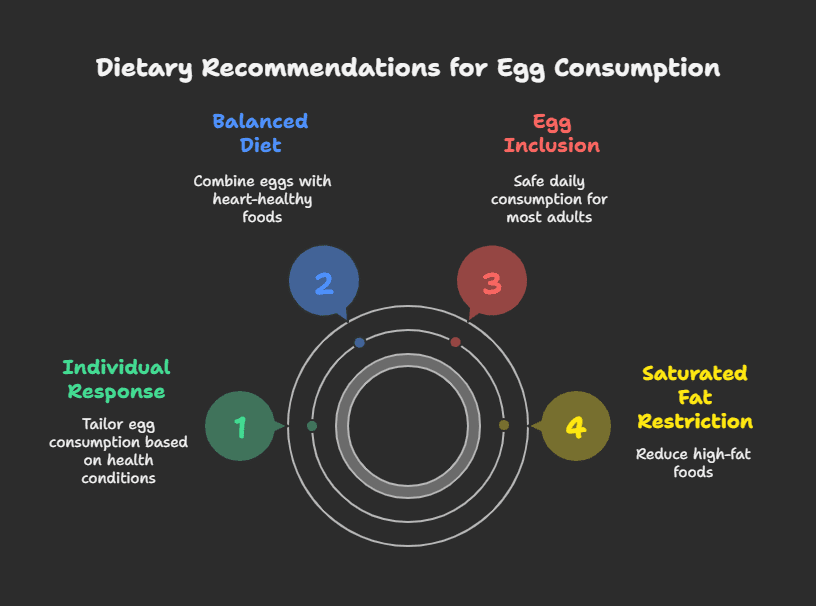Moderate egg eating does not appreciably increase blood cholesterol in the majority of individuals, since the body compensates for cholesterol production to match intake, and saturated fat contributes more to elevating LDL cholesterol than dietary cholesterol itself. People differ in their response: “hyper-responders” can experience small increases in LDL and HDL levels, but the ratio of LDL to HDL usually is not affected. Meta‑analyses indicate that one egg daily is usually cardiovascular safe, while greater intakes can benefit or harm certain subgroups based on overall diet quality and health. Eggs are nutritionally dense foods that provide first‑class protein and key micronutrients in a compact format, and eggs can be an excellent addition to a well‑planned meal when eaten intelligently with other heart‑protective foods.
Can Eggs Raise Cholesterol? This question has fueled decades of controversy among nutritionists, cardiologists, and health‑aware consumers. Eggs are an easy and inexpensive source of high‑quality protein, yet their yolks pack a big dose of dietary cholesterol, about 186–210 mg per large egg. Traditionally, nutritional guidelines advised restricting egg consumption to control serum cholesterol, but new evidence indicates that dietary cholesterol might have less of an effect on blood cholesterol than previously believed.
Introduction
Cholesterol is a waxy material necessary for cell membranes, hormone synthesis, and vitamin D production. The body receives cholesterol from two sources: endogenous synthesis (mainly in the liver) and dietary absorption. Low-density lipoprotein (LDL) delivers cholesterol to tissues, whereas high-density lipoprotein (HDL) returns excess cholesterol to the liver for elimination. High LDL cholesterol is an established risk factor for atherosclerosis and cardiovascular disease (CVD), while increased HDL is usually protective.
Dietary vs. Blood Cholesterol
In most individuals, dietary cholesterol has a minor impact on blood cholesterol due to the liver reducing cholesterol output in response to increased intake. In about 15–25 percent of the population, also referred to as “hyper‑responders,” there are larger increases in serum LDL and HDL following intake of dietary cholesterol, but usually, the ratio of LDL to HDL does not change significantly, offsetting CVD risk.
Egg Nutritional Profile
A big chicken egg (~50 g) contributes approximately 70 calories, 6 g of protein, 5 g of fat (including 1.6 g saturated fat), and 186–210 mg of cholesterol, all being in the yolk; there is water and protein only in the white. Apart from cholesterol, eggs have essential nutrients in the form of vitamins D, B12, A, and E, minerals like selenium and phosphorus, and choline, a critical nutrient ensuring brain health as well as intact cell membranes.
Can Eggs Increase Cholesterol? What the Science Says
Randomized Controlled Trials
Subsequent systematic reviews and meta-analyses of randomized controlled trials have concluded that egg addition to the diet raises total cholesterol, LDL‑C, and HDL‑C versus no‑egg diets but not versus low‑egg control diets; the size of the difference is small and inconsistent between studies. Another analysis concluded that each 100 mg of dietary cholesterol increased LDL by approximately 1.9 mg/dL and HDL by approximately 0.4 mg/dL, changes not likely to greatly modify cardiovascular risk in most individuals.
Observational Cohort Studies
Prospective studies that follow tens of thousands of adults for decades typically have no robust correlation between moderate egg consumption (up to one egg per day) and raised risk of coronary heart disease or stroke in healthy groups. A meta-analysis published in the Journal of the American College of Nutrition found that up to one egg per day did not increase CVD risk, but greater intakes had inconsistent results based on the health and eating habits of participants.
Subgroup Considerations
- Type 2 Diabetes: Certain studies reported that in people with type 2 diabetes, increased egg intake (greater than one per day) is associated with higher CVD risk, perhaps because of differences in metabolism and dietary confounding factors.
- Genetic Predisposition: Hyper‑responders, approximately 15–25 percent of the population, have small increases in both LDL and HDL cholesterol but preserve a constant LDL/HDL ratio, indicating minimal effect on CVD risk.
- Overall Diet Quality: Eggs in the context of an overall good, plant‑rich diet are associated with healthier cardiovascular results than eggs eaten in the context of high‑saturated‑fat foods such as bacon and butter.
Mechanisms Behind the Response
Dietary cholesterol affects serum levels via feedback responses: excess intake downregulates hepatic cholesterol production and upregulates LDL receptor activity, which facilitates cholesterol removal from blood. Saturated and trans fatty acids, and not dietary cholesterol, exert a more predictable effect on elevating LDL cholesterol and advancing atherogenesis.
Practical Recommendations

- Restrict Saturated Fat Emphasize reduction of high‑saturated‑fat foods (e.g., processed meat, whole fat dairy) instead of strictly cutting dietary cholesterol.
- Include Eggs in a Balanced Diet. One egg per day is safe for most healthy adults; two eggs a day may be tolerated in older adults with normal LDL.
- Combine Eggs with Heart‑Healthy Foods. Eat eggs with vegetables, whole grains, and healthy fats (olive oil, avocado) to maximize nutrient benefits and reduce harmful effects.
- Watch for Individual Response. Individuals with hypercholesterolemia, diabetes, or genetic susceptibility should speak with healthcare providers and track lipid profiles when changing egg consumption.
Frequently Asked Questions
Q: Does consuming egg whites rather than whole eggs resolve cholesterol issues?
Egg whites have no cholesterol or fat and offer protein but not the micronutrients in the yolk, such as choline and vitamin D.
Q: Might fortified or omega‑3 enriched eggs be beneficial?
A few studies suggest that omega‑3 fortified eggs may enhance lipid profiles without increasing LDL cholesterol, possibly because of supplemental unsaturated fats and vitamins.
Q: Are free‑range eggs healthier?
Free-range eggs have slightly higher intakes of specific nutrients (e.g., omega-3s), but have the same cholesterol effect as traditional eggs.
Conclusion
Can Eggs Raise Cholesterol? In most people, everyday consumption of up to one egg per day does not substantially raise blood cholesterol or enhance cardiovascular risk, provided as part of a diet that is low in saturated fat and high in plant‑based foods. There is individual variation, so individualized dietary choice, based on lipid monitoring and expert recommendation, keeps eggs a healthy and heart‑friendly choice.








